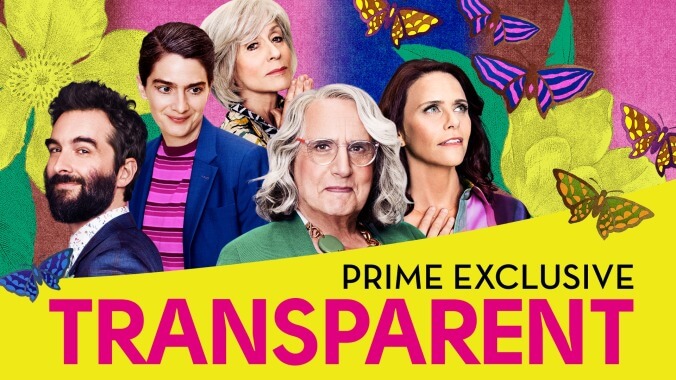Transparent’s first episode in Israel feels jetlagged

I value Ali Pfefferman as a POV character in “Pinkwashing Machine,” because I am, as an American Gentile who lacks even a basic operating knowledge of the Israeli-Palestinian conflict, at an intellectual disadvantage here. As the youngest Pfefferman heads into the West Bank with her new friend Lyfe (Folake Olowofoyeku), my preconceived notions are eliminated right alongside Ali’s. Her ignorance is my ignorance, and I own up to that. But as the excursion heads to Janan’s family goat farm, and other characters share their stories with Ali—characters whose names I only know because of the X-Ray feature on the Amazon video player—I begin to feel like “Pinkwashing Machine” is the episode of Vice Lyfe jokingly alluded to earlier. I have gained insight into the nuances of a fraught geopolitical situation that I might not have if I’d never watched Transparent. But then I ask myself: Is this what I want to get out of Transparent?
A trip to Israel feels like a logical next step for Transparent, as part of the show’s ongoing examination of the Pfeffermans, their past, and where they all fit into the grand scheme of things. But even for an episode that uses a lecture as subtextual stage-setting, “Pinkwashing Machine” is an uneasy mix of art and academia. This seems to be the space where Jill Soloway’s creative mind is at these days, given the headier aspects of I Love Dick. But there’s a point where a work of fiction relinquishes its ability to move and entertain in favor of informing and educating, and this episode gets dangerously close.
But before all of that, the Pfeffermans who are back in L.A. have their season-long arcs put into place, continuations of or variations on paces they’ve been put through before. There’s a new cockamamie scheme for Sarah, after she and Len get two positive results from Lila’s “kids on top” hypothesis. (Don’t call it that.) Shelly’s experience with improv goes poorly, as anyone who’s ever seen a second of Transparent might’ve guessed. The fallout from her abortive Coney Island scene really hammers home the whole “boundary issues”/“undefined borders” idea, but at least it factors into what’s looking increasingly like a genuine attempt at recovery for Josh. It also gives the episode its biggest laugh, as a painful argument between mother and son is punctuated with Jason Mantzoukas’ extremely dry “I also don’t feel safe.”
These are all fine slices of life that are only just starting to take shape, but none have the weight of the Maura and Ali stuff, the gravity of which will eventually pull the rest of the family to the Holy Land. And “Pinkwashing Machine” seems to foreshadow how that’s going to happen: By sheer coincidence—predicated on the idea that no one in Tel Aviv previously thought to ask Maura “Any relation to Moshe Pfefferman?”—she appears to have found her long lost father in a piece of kitschy air-conditioning advertising. There he (possibly) is, in the sun-tanned guise of Jerry Adler, sitting awkwardly with swimsuit models and wasting all that AC on the outdoors. Maura has a hunch, Bryna backs her up, and there you have a solid cliffhanger for an early episode of season three.
This also strikes me as uncharacteristically blunt: In the course of getting in touch with her roots, Maura may have just tripped over an actual root. But maybe I’m just letting my misgivings about one part of the Israel storyline color another. I feel like, if anything, what I miss about this particular chapter in the Pfefferman saga is the Pfeffermans themselves. There are pieces of everyone here and there, but a lot of “Pinkwashing Machine” is about other people: About Moshe, about Ali’s new friends at the farm, about Dr. Steve, about Lila. It isn’t like these characters to allow anyone to steal the spotlight away. But like Eric hinted at in his premiere review, maybe they’re running out of stories to tell in that spotlight. If Shelly’s improv teacher was watching “Pinkwashing Machine,” she might suggest that it’s inventing too much, allowing the characters to be pulled in new directions by plot, rather than allowing those characters to be the ones in the lead. It’s plot on top, if you will.
I look to Transparent to tell me stories of lives that are unlike my own, and for most of its run, it’s done so with a breathtaking panache, with those lives rendered in deeply felt performances and with a rich visual imagination. But as Ali learns about the daily difficulties Palestinians her own age are facing, I couldn’t help but feel like maybe I’d rather see those people’s lives for the next seven episodes. There are some signs in “Pinkwashing Machine” that the Pfeffermans still have things to say, still have their own stories to tell. But too much of this particular episode is wrapped up in having people say things to the Pfeffermans.
Stray observations
- Really, though, I can see how that “Cool Guy” jingle would’ve stuck with people for years and years. I heard it for the first time a couple of weeks ago, and it hasn’t left my head since.